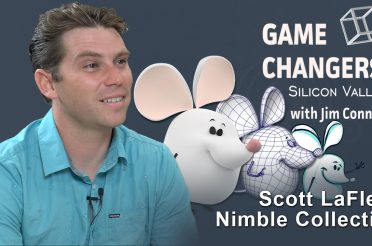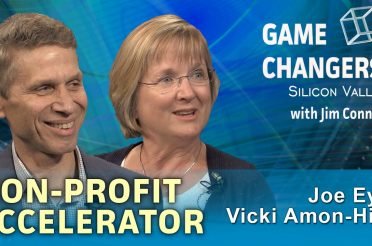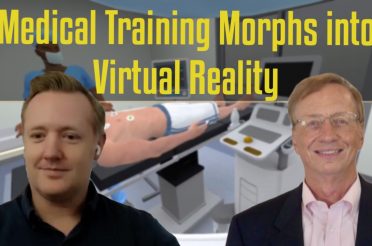Overview

If you are a CEO with several years of startup experience at a brand name IPO, or you are part of the founder team with several successful exits, then you have the track record to shop your company’s financing needs to venture capital funds and angel investor groups.
However, if you are a team of first-time entrepreneurs with no track record in the startup world, then you are likely to find a more receptive audience within the angel investor community.
The angel investor community is not a single type of investor. There are unique aspects and preference to each angel investor and angel investor group.
The podcast is about the mind and heart of the angel investor with Jonathan Wu, Vice President of the Sand Hill Angels.
Join us Jonathan sits down to give us his perspective on seed funding, how entrepreneurs gain traction with angel investors, and avoidable mistakes entrepreneurs make. Jonathan also provides insight into the type of mentorship an angel investor can make including his own experiences in helping startup companies to accelerate their growth.
Key Concepts
The conversation had the following primary points:
- The best way to initiate contact with an angel investor is to do some research to find those individuals who have experience or domain knowledge in the products or market you are serving. They may be willing to meet or have a call with you to review your ideas and mission into an area where they have expertise.
- The importance of being prepared for an effective conversation or presentation cannot be over-emphasized. Knowing your product, market fit, technical advantages, competition, and the assumptions for your financial projections are essential qualifiers in gaining engagement with all types of investors.
- Startup companies have some choices in how they create and deliver value with their customers and partners. For Jonathan, his approach was to deliver strategic value to his partners who had incorporated his products as part of their solutions. By delivering long term strategic value to his business partners, his company became highly desirable as an acquisition.
- Understanding and being able to communicate how your company will create and deliver value is essential to your business and investor relationships.
Transcript
Website Link - : www.sandhillangels.com
Jim My guest is Jonathan Wu who is an active angel investor who is the Vice President at the Sand Hill Angels and a board member. Jonathan welcome to the podcast.
Jonathan Thanks. Jim, I’m excited to be here.
Jim We have a lot to talk about. You’ve got a great background as we were just chatting a little bit before the show started here so I thought we’d start by you defining the concept of early-stage investing, primarily done by angel investors.
Jonathan OK. So you know my perspective is angel investors are individuals that are willing to invest in and that is placed money into very early-stage companies. These are individuals that have ideas it may be a concept for a business. So it is that that risk-taking that these individuals investors are willing to make. So there is a belief in the idea that this startup may have with obviously the goal of having some sort of exit and return that significant later on.
Jim What leads a person to become an angel investor.
Jonathan You know I think it is wanting to participate in a company the start of a company the early stages of a company where that investor believes in the product or maybe the services that these startups offer and are passionate enough as well as have the financial resources to write a check and help fund that company and also realize that these investments are high risk and there could be a loss of that investment. And in most cases that does occur.
Jim Because the numbers that the Venture Capital industry quotes, which is essentially they’d like to see two out of 10 become hits, is that about the same for angel investing in your from your perspective.
Jonathan You know I think all angel investors would like to have every single one of their investments be a hit. But that’s not reality. I think the reality is reflected in a study that I saw about down it’s 8, 10, or even 12 years ago which showed on average for angel investors investing in 10 companies and minimum 10 companies. You know you’re going to have four or five that are just going to lose everything that you invested and you’re gonna have another two or so that are going to return something you know it may be pennies on the dollar and then you can have another one or two that return some sort of multiple it may be one times your investment two times and then out of that 10 you may have one that makes up for all the other losses. And given my experience which I want to say 25 angel investments over a period of time period of maybe I think 15 to 20 years I can tell you that the ranges that I just gave you are reflective of that.
Jim So we talked a little bit about the role of the individual angel investor and then the person who joins our group in angel investing group. Right. What’s your perspective on that.
Jonathan OK Jim. So when I first started I was an individual angel investor so there was a number of opportunities that were presented to me where I wrote a check. It was based upon my understanding of the company. The first one ended up being a beverage company it was a beer cup. Which I really like the product. However, you know I didn’t have that domain expertise when it came right down to it. And so over a period of time realizing that there was a number of opportunities that were out there that I didn’t necessarily have that deep domain expertise to really understand what the company was doing or how they were going to hit these various milestones to be wildly profitable. So I started looking at various angel groups and the beauty about an angel group is that you know with the members there is diversity when it comes to individuals domain expertise. It may be network it may be an operational experience that is there. And so you look for a group that can provide you know effectively the knowledge of the experience that as an individual investor I was lacking. So it helped complement my skills as well as understanding.
Jim And I think that because you’re a group you get a much broader sense of deal flow or there are more companies applying as an individual you can only meet with so many individual companies as a group, you have this concept of deal flow right.
Jonathan Without a doubt. You know a group is highly scalable. You know where an individual industrial can only review a handful of these, and in certain cases as I pointed out don’t necessarily have the expertise to evaluate a deal and so it’s best when you’re with a group that you’ve got other members that have that expertise that can take a look.
Jim A good point. I’ve seen you know I’ve seen bio life science deals which many of us don’t have any expertise or whatever but you see other people a group who know what’s going on and they can attest to the viability and perhaps the soundness of this technical approach of their companies proposing.
Jonathan Oh without a doubt. You know I don’t have a life sciences background but one of the best deals that I’ve had in terms of return was a life sciences deal that came out of Sand Hill and it was because it was a number of members of Sandhill that took a look at the opportunity and said you know here are the pros of of why this investment makes sense and here’s some of the areas that you know are of concern. Overall took a look at it and felt like it was a good investment. And in this case I was correct.
Jim So I really wanna get to this topic now which I know our audience is very interested in and that is the concept of seed funding. You are a strong proponent of participating in seed funding. And I’ll ask you to define what is seed funding in your world.
Jonathan So let me walk you through the stages of the company when an individual decides that they’ve got an idea you know in certain cases that individual or individuals. The founding team may fund the company to get started filling out the paperwork to organize the company. It may be to work on the original concept of what have you you know beyond the funding that takes place from the founder group. There may be some friends and family that takes place that is those people.
Jim They don’t have to be accredited Is that correct.
Jonathan They don’t have to in that early stage. But you know I think you know as an entrepreneur you always have to evaluate you know do you feel comfortable taking money from friends and family knowing that you know this is a very early stage and there may be a risk of them losing that investment. I mean obviously, you don’t go into any venture thinking that’s going to fail but there’s always that possibility until you get to a truly viable business which means your you’re profitable and that may be a long road. So in terms of stages here you’ve got the entrepreneur the founders that may self-fund at the early stage they may bring in friends and family to invest. And so after those two stages you know the first outside money is seed funding and that seed funding typically takes place with individuals angel investors maybe an angel investor group that would write a check for that stage of the business and that stage of the business may be still at the concept stage and might be the proof of concept you know in terms of a technology that’s there but clearly you know at the seed stage they don’t necessarily have customers at this point in time or at least paying customers.
Jim. So I’d like to just move on to this other area. What is the process within an angel group your angel group in particular when an entrepreneur comes in and what are some of the most common mistakes or that entrepreneurs make that they shouldn’t make or don’t need to make? Any anything you can offer there what you observe as a process being what derails an entrepreneur.
Jonathan So let me. Help define Sand Hill’s process, so we receive on average anywhere between 50 to 60 submissions a month and these are applications that come through our Web site which an entrepreneur is seeking funding as well as mentorship. And in these applications is a series of questions that we ask in terms of company background what stage of the company is at. What do they anticipate the pre-money valuation to be how much are they are raising and other characteristics in terms of you know product market what have you. So that’s the first stage. You know we take a look at these submissions and then narrowed down to just a handful that we’d like to perform further analysis on. And then from there narrowed down even more to you know those that we end up doing due diligence and eventually investing in. So you know what’s important for entrepreneurs to know is whenever you submit to you know an angel investor group make sure that you reach out and understand what their characteristics are. Is this an area or a domain an industry that they invest in. So you want to do some research beforehand. Another aspect is to take a look within the group are there individuals that you can reach out to for guidance on understanding their process and help ideally shepherd you through the process as much as possible. The third aspect is being prepared so being prepared is making sure that you’ve got all your corporate documents together and organized. You’ve got your financial plan as well as assumptions laid out. You understand the market very well and are reasonable when it comes to a valuation at your stage of the business. So what derails these type of opportunities are when an entrepreneur is not prepared; when the valuation far exceeds where they’re at and the expectations that come along with it. And so those are just a couple of things that I would say derail.
Jim When you say not prepared, do you mean they are unable to answer questions they should be able to answer such as how much money is in the bank today. What are your revenues? All these kinds of things.
Jonathan Right yeah. What is the monthly burn rate? You know your cash projection that you have no other risk factors. You know the worst is when we ask an entrepreneur and they shoot from the hip and come up with an answer that clearly isn’t supported by the data that they’ve already presented. So it just undermines credibility.
Jim I think that loss of credibility is the bigger one or loss of integrity and that usually comes from about of perhaps letting a half-truth go out which is later discovered or known immediately because I’ve noticed that some entrepreneurs simply don’t understand the experts that are in the audience know more than they actually know about an industry.
Jonathan Yeah we’ve seen that time and time again where you’ve got a company that’s presenting and they believe that they’re stating facts about maybe a certain technology as an example when in fact there’s members of Sand Hill that in certain cases helped create that underlying technology and so it puts it in a very awkward position when the entrepreneur doesn’t really know their technology to any great extent but puts out you know statements that they’re saying you know it operates in this one way so it undermines credibility.
Jim So then after they get through that initial screening process or some preliminary due diligence they go if they’ve made it past or they go to a broader consideration is that right?
Jonathan Yeah. So what we have is a screening dinner meeting that takes place where there are typically anywhere from six to nine companies that are invited to come in and present they’ve got a few minutes to present as well as Q and A provides exposure to the members. From there we take a look at interest levels and then form a due diligence team which then provides you know a greater in-depth review of the company. And depending on the interest level within these companies they are then invited to present to the general membership. And the general membership is one where you know people are effectively voting with their dollars and they’re expressing a level of interest ideally at that point in time due diligence is complete or it’s close to being completed so that we can then convey to the entire membership you know here are the pros in terms of this investment opportunity. Here are the areas of concern. And overall it allows people to evaluate and make their self-determination in terms of, if they want to invest and how much they want to invest.
Jim So the new investments made will just move ahead. And then after the investments made does you have been involved in being a board member of a company is that right?
Jonathan Oh yeah. So you know there’s a number of ways. So with Sand Hill, right now there are roughly one hundred and ten members. And so as a group we have a limited liability vehicle investment vehicle where members that are interested in say a portfolio company we will write a check to the limited liability company, Sand Hill Angels then writes one check. So if you have 50 members that are interested all 50 write a check to that limited liability company that Sand Hill has, one check is then written to the portfolio company and then from there we elect one representative from Sandhill to be the point person for that portfolio company for you know investor updates for guidance and advice. So one company that I’m helping out right now it’s everything from introducing them to other Angel groups they can complete their fundraising round, to helping identify potential candidates that they can hire; In this case, they needed better candidates for their V.P. of sales V.P. of Marketing and now V.P. of engineering.
Jim. I’d like to go into this area that many people do not talk about or they don’t give it enough depth and that is the mentorship that gets provided by an angel group. You just started to enumerate a few of them about the recruiting, the financial advisory work that is provided. Can you elaborate a little more about that and what you’ve done yourself.
Jonathan So it’s range from you know introductions to other investors to introductions to candidates for these entrepreneurs to hire to help round out their team. You know in a lot of cases we see entrepreneurs that you know it’s their first time. And so it’s best to help supplement their team with experienced hires that have worked in a startup environment that helped grow these various companies. It is reaching out to potential customers and providing introductions. So I’ve done that before where you know it’s someone that I may know within a company that could utilize the technology as an example. It may be reaching out to industry analysts that follow this space so one company is a business intelligence company. You know I know several industry analysts with various firms that have reached out to you to get perspective as well as introduce, so that’s always important. It may be strategic partners. So you’re helping out and you’re using your network to help that company succeed.
Jim Now that’s because you were the deal lead for the company or did you do this after you made the investment.
Jonathan So I’ve done it in both cases where I’m helping to guide and shepherd a company through sand Hill’s process and then after the fact where sandhill has invested and you know I’ve been elected the class manager and I’m helping to guide and mentor you know the portfolio company. You know it’s from my perspective it’s this if the company is successful then our investment is going to be successful. And so we want to see success all around.
Jim You know one of the remarkable things that I’ve noticed and people have commented about is the willingness insane in Silicon Valley successful former entrepreneurs if you will investors or people of influence to help other people out. And it seems like this is very evident in what you’re talking about today. And so my one question on this is, in your mind how prevalent is that value system of being willing to help out entrepreneurs with no immediate return shall we say in your mind is it just Sand Hill or is it just you or is it pretty broad.
Jonathan No I’d say it’s pretty broad but you have to be selective in who you’re working with. Not everyone’s going to view it the same way. You know some may look at it from an economic perspective and want to charge for it. You have others that are willing to freely provide the guidance and advice and then you have others that you know they have different levels of experience and knowledge and so you have to weigh all these different factors. But that is a prevalent mindset or thought process that takes place here where you know it’s giving back to this entrepreneurial spirit. And I think it’s because a lot of us have had that experience of starting companies growing and getting to an exit. It’s just that process that thrill of the ride is helping to drive it all over again. And that’s why I love angel investing.
Jim Well, you took me right into my next topic beautifully I have to compliment you because that is back to your personal story and how that relates to what you’re doing today. Tell us a little bit about how you got to where you are today.
Jonathan So my education and background I received a business ministrations degree in accounting and finance from California Berkeley started out in public accounting did that for about seven years. I loved it but at the same time I also took a lot of computer science classes the Cal and when there was an opportunity to work on a very large multi-currency portfolio accounting system to develop for a large financial institution in San Francisco, I jumped at the opportunity and did that for about a year with several other colleagues from Pricewaterhouse. We ended up forming our own company that was focused on this field of business intelligence and data warehousing. You know we grew that merged with another and then yeah I think it was eleven years after we started. Ended up selling the company to HP. So I stayed with HP for a year, joined a sand Hill Angels, ended up mentoring and guiding several companies. I was on the board for one of them were then the founders asked me to step in because none of them had any sort of operational experience. All of them were technologists and I was the only one that had the business background and so they asked me to step in as the CEO; stepped in this CEO, helped put together really a process the organization helped grow the business and served in that capacity for about 15 months. And then it was turned back over to the founders.
Jim That’s great. But to go back to that one the first major exit that was 11 years then correct?
Jonathan It took eleven years. You know what we see is you know organizations that are building significant value, there’s a process that it takes and that process is typically about 10 years.
Jim I think that’s overlooked by many entrepreneurs and people think about how they could build a company in four or five years and get it sold and it does happen on occasion that a technology a particular technology, so, shall we say, hot and large companies decide: “we’re just going to buy that versus invent in ourselves”. But the more common by far more common scenario is the 10, 12, 15 years situation.
Jonathan Oh without a doubt. You know what I see is entrepreneurs that go into a business idea where they’re building an organization they’re building this business to flip. In other words sell real quickly you know that doesn’t always work in a lot of cases I see a lot of failures out of it. Whereas if you build an organization for greatness where you’re creating value and creating value is you’ve got good products, you’ve got good services, you’ve got outstanding customers, you’re growing your business, it’s going to attract other organizations that will want to buy you. And I’m not talking about just a financial sort of you know discounted cash flow valuation, I’m talking about strategic value that pays a premium for all of the hard work and energy that you put into it. That strategic value is quite rewarding.
Jim Let me ask you, what was your exit, what was your transaction process like did you go through a very long due diligence with HP or was it quick. Did you have great chemistry right away Did you know who you’re going to be working for? Maybe you just give a little guidance on that.
Jonathan So it was interesting. So our company had an inflection point where we grew quite significantly and we were competing against several other organizations that were out there in terms of very large business intelligence data warehousing type products and rather projects and solutions that were out there. So we had IBM and Accenture approach us wanting to acquire us. We entertained their offers because we had to and I was on the board of that company as well. And you know those weren’t strategic at all. And I think it was maybe two months after we turned those two down that HP approached us. Just out of the blue. And HP was also one of our customers. So they’d seen us work and at that point in time Mark Hurd was very interested in growing a product which he called NeoView and you compete against his former company, Teradata. And so he was looking at Knightsbridge to help grow that that area the business. And that’s where you know there was the strategic value in terms of the process from start to finish. I believe it took about six months. It’s very thorough you know it’s one of those where members of the founding team as well as key employees, everyone has background checks on them. You know they’re doing reference checks with customers. They’re really doing a deep dive in terms of the financials as well as you know where all the intellectual property that exists the knowledge base. What have you?
Jim Did you have a third party negotiate on your behalf for the company’s behalf?
Jonathan We did.
Jim Wise decision?
Jonathan Without a doubt. You know it helps to have a third party group evaluate terms as well as provide a reference point and help smooth the tenuous type negotiations that would take place throughout.
Jim So anything coming up in the future for your efforts your work your directions independently by yourself or with Sandhill lanes which would like to mention.
Jim So I’m still very active with Sand Hill Angels. I enjoyed that aspect. But what I’ve been doing lately, in addition, to Sand Hill is mentoring and guiding a handful of companies. You know I’m not looking to do you know hundreds of companies I’m looking at you know roughly five or six companies I’m working with four right now which I’m actively engaged with the founders, the members of the management team helping them grow. So in one case you know I helped a company go from two and a half million in revenue over a four year period, I got him to 20 million before they got to an exit. You know another one. As you know I’m helping this company that’s been struggling in terms of revenue and trying to get to the next level. And the third is you know an early stage company which is looking to fundraise. How do you go out and fundraise in this case? And so that’s where the guidance is because we’re not through that process.
Jim That’s really remarkable. I am I admire and want to compliment you for the contribution, the give back that you’re making to the valley into the ecosystem of entrepreneurs in this area. A wonderful story there. Jim: Well, I want to thank you again. I really enjoyed the conversation. And I look forward to hearing more about you and I wish you every success going forward. All right. Thanks, Jim. Thanks for the opportunity.








Leave a Reply
You must be logged in to post a comment.